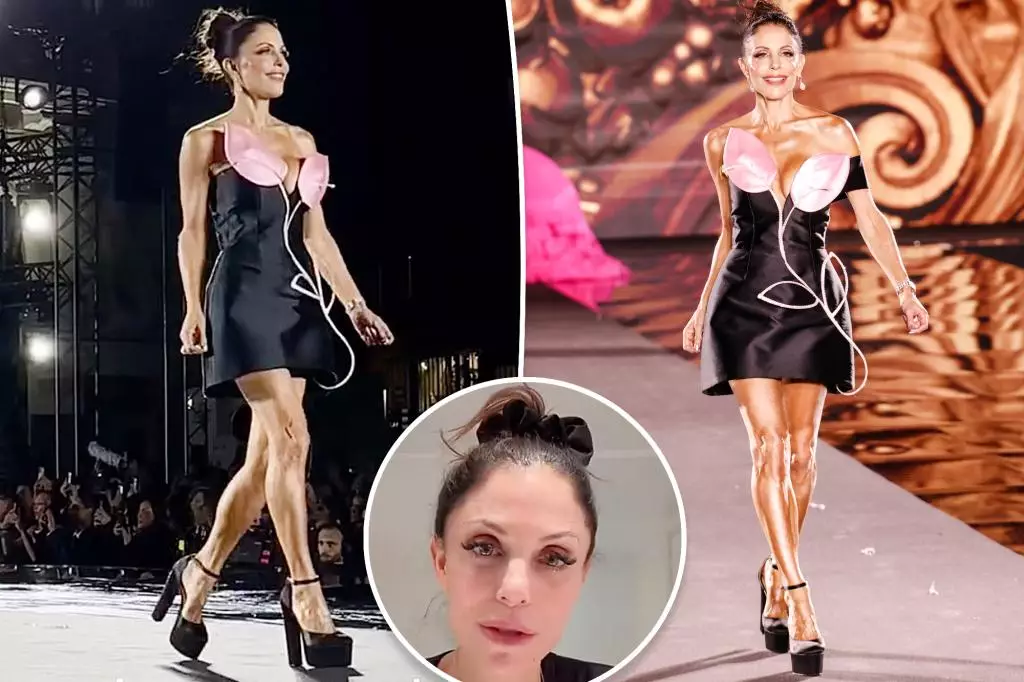Bethenny Frankel, known predominately for her role in “Real Housewives of New York City,” showcased a surprising turn in her career by stepping onto the runway at the L’Oréal Paris Fashion Show. While one might expect such an event to be met with acclaim, the reality star was met with mixed reactions, primarily stemming from the peculiar style of her runway walk. Sporting high black platform heels and a strapless minidress adorned with pink floral appliqués, Frankel’s self-proclaimed debut as a “supermodel” became a hot topic of conversation, but not necessarily for the reasons she might have hoped.
The video posted on Frankel’s Instagram, which featured her spirited yet unconventional stomping down the runway, drew a flurry of comments. Instead of the enthusiastic support typically reserved for celebrity fashion moments, the comments section reflected a mixed bag of critiques. Many users were quick to note what they perceived as awkwardness in her gait, questioning the choice of footwear and suggesting she looked uncomfortable. This reaction is not unusual in the world of social media, where every move is meticulously dissected and judged, often leading to a cruel culture of commentary.
What Frankel encountered illustrates a broader point about public perception and the nature of fame. Here she was, a woman stepping out of her comfort zone and attempting something entirely different, yet rather than being celebrated for her courage, she faced scrutiny. The nuanced nature of online forums often amplifies negative opinions, creating an echo chamber where critique reigns supreme. Frankel, however, did not back down. Instead, she responded in kind, proclaiming her commitment to embracing the individuality that the event celebrated and emphasizing the importance of “being perfectly imperfect.”
Frankel’s comments hint at a deeper appreciation for authenticity. In her Instagram post responding to the criticism, she described her intention of wanting to look like a “giraffe,” with long, elongated legs striding powerfully down the runway. In a world that often prizes perfection, Frankel’s self-awareness stands out. The fact that she chose to walk differently, not necessarily conforming to established norms of what a “model walk” should look like, falls in line with the ethos that L’Oréal promotes: that of self-acceptance and individuality.
Throughout the backlash, several fans rallied to support Frankel, celebrating her bravery and enthusiasm. Their comments reflected admiration for her ability to let go and enjoy the moment despite the criticisms. In a striking way, this dichotomy between the voices of criticism and support presents a paradox of the modern social media landscape. Individuals can uplift and empathize with one another while simultaneously tearing them down.
Social media can often feel like a double-edged sword—offering a platform for connection and support, yet often devolving into hostility and negativity. Frankel’s experience is a reminder of this precarious balance. While she faced ridicule, she opted to focus on the joy of the moment and the unique opportunity she had to express herself.
In reflecting on Frankel’s approach, one can glean a valuable lesson in self-acceptance and resilience. Her determination to embrace her own style, her unique approach to runway walking, and her ability to deflect negativity in favor of self-expression all act as teachable moments about individuality. Frankel emphasized that doing what resonates with oneself is paramount, and it’s a sentiment that resonates in a world often dictated by external standards and expectations.
Bethenny Frankel’s foray into the fashion world at the L’Oreal Fashion Show is more than just a viral moment; it’s a microcosm of the struggle for identity within the public eye, the contrasting reception of authenticity, and ultimately, the celebration of what makes us unique. Whether one agrees with her walk or not, her stance on individuality and self-love resonates deeply—encouraging all to embrace their true selves, even in the face of adversity and critique. As the accolades pour in alongside the trolls, Frankel emerges not just as a participant, but rather an emblem of self-empowerment in a complex world.

